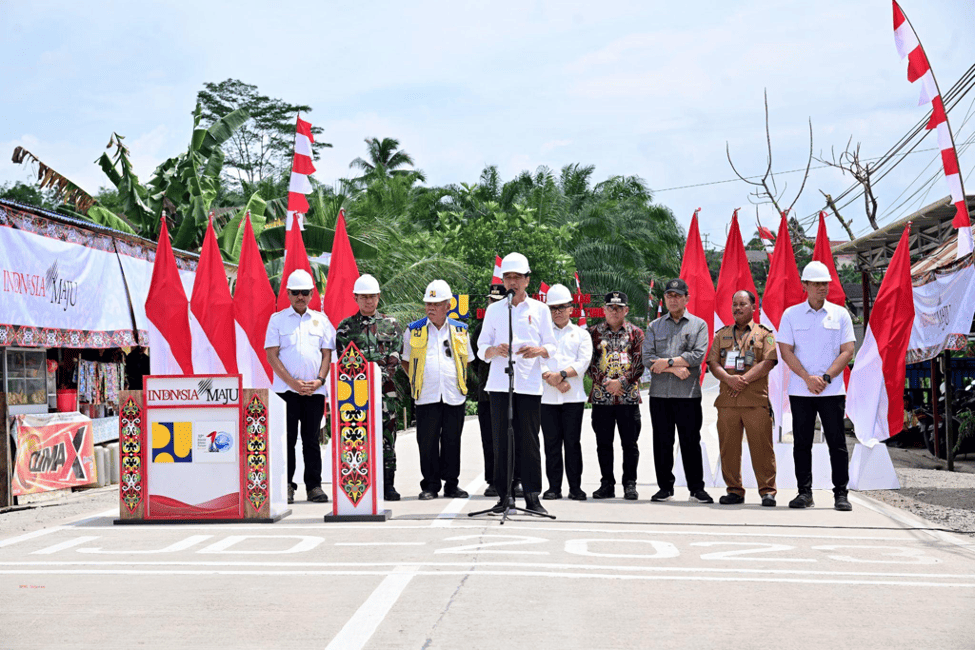Papua – President Joko Widodo rode a dirt bike to directly inspect the new seven-kilometer road that is part of the Wamena-Mamugu 1 road section in Jayawijaya Regency, Papua in May 2017. The trail, which at the time was still a dirt road paved with stones, presented its own challenges for Jokowi and his team. They had to face difficulties when crossing the road to monitor ongoing infrastructure development.
To overcome the challenges of the tough terrain, the government is working with the Indonesian National Army (TNI) in the process of land clearing and early stage work. Once the route has been cleared, work will be continued by the construction team from the Ministry of Public Works and Public Housing. Jokowi added that this collaboration between the government and the TNI is very important to accelerate the development process.
To date, around 3,500 kilometers of Trans Papua roads have been built. In addition, the government has also developed around a thousand kilometers of roads in Papua’s border areas, and established a number of cross-border posts to improve accessibility. One of the infrastructure landmarks built is the Youtefa Bridge, which was inaugurated in 2019. The 732-meter-long bridge connects Holtekamp and Hamadi in Jayapura, and is a symbol of infrastructure progress in Papua.
Jokowi emphasized that Papua is a government priority in the context of comprehensive development across Indonesia. His development concept seeks to shift the focus away from Java and big cities towards greater attention to remote areas.
“Indonesia’s development is no longer Java-centric, but Indonesia-centric,” he said when inaugurating the Papua Youth Creative Hub in Jayapura in March 2023.
As a form of commitment and supervision, Jokowi asked the Papuan people to participate in overseeing ongoing development. He emphasized the importance of transparency in the use of the budget, which has reached Rp1,036 trillion from various sources, including the central, provincial, district and city governments.
“I ask the people in Tanah Papua to continue to supervise so that this budget is not misused,” he said.
Papua, with its abundant natural and cultural wealth, has faced various development challenges over the years. In an effort to address these issues, the Jokowi administration has launched various programs and policies to accelerate development. One important step is Presidential Instruction number 9 of 2020, which provides a legal foundation to accelerate progress in Papua.
In late 2021, Law number 2 of 2021 was also passed as a revision of the Papua Special Autonomy Law, which aims to protect the basic rights of indigenous Papuans in various aspects, including economic, political, and socio-cultural. Jokowi also noted that during his time in office, he has visited Papua 19 times, as a show of concern and to ensure that development projects are going well.
With the improvement of infrastructure, it is expected that the regional economy can grow, and people have better access to education and health services. In telecommunications, the construction of the East Palapa Ring network is also underway to improve connectivity.
In the transportation sector, the government has completed the construction of ten airports, with six of them located in Papua Province. In Jayapura Regency, a container port is also being built to improve the mobility of goods and people, as part of the Jayapura-Sorong-Merauke sea toll port route.
The government is also committed to developing the local economy in Papua through programs such as the Papua Economic Development Acceleration Program (P3EP), which supports farmers and fishermen. In addition, the development of MSMEs is a priority, with the provision of training and access to capital to improve community welfare.
With all these efforts, Jokowi hopes that Papua can become a prosperous and independent region, so that Papuans can actively participate in national development.


